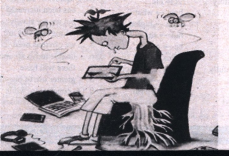��Ŀ����
�ٶ�Ӣ�������ʦҪ��ͬ��֮�佻�������ģ���������ͬ��д���������ġ����й���10�����Դ���ÿ���������������ÿ��������漰һ �����ʵ����ӡ�ɾ�����ġ�
����:��ȱ�ʴ���һ��©�ַ���(��) ,������ ����д���üӵĴʡ�
ɾ��:�Ѷ���Ĵ���б��(\) ������
��:�ڴ��Ĵ��»�һ���ߣ����ڸô�����д ���ĺ�Ĵʡ�
ע�⣺1. ÿ���������ľ�����һ�ʣ�
2. ֻ������10��������(�ӵ�11����) ���Ʒ֡�
This afternoon I walked into a small store just for quick look. There I find a little girl holding a large colorful toy. She eager asked her father to buy it to her. However,her father said no to him because he couldn��t afford it,though it would cost him only 20 yuan. Disappointed although she was,the girl was accepted her father's decision. When the father went to the other end of the store to look at something,I asked him that I could buy the toy and give it to his daughter. He looked surprising for a few minute but eventually agreed. I did what I had promised and then left the store.
1. . .. for quick look. quick ǰ�� a
2. . .. find a little girl... find ��found
3. She eager asked ... eager��eagerly
4. . .. buy it to her. to��for
5. . .. said note him ... him��her
6. Disappointed although she ... although�� as / though
7. . .. the girl was accepted ... ȥ�� was
8. . .. I asked him that... that��if / whether
9. He looked surprising ... surprising��surprised
10. . .. a few minute ... minute��minutes

 ��������һ���þ�ϵ�д�
��������һ���þ�ϵ�д� Сѧ��10����Ӧ����ϵ�д�
Сѧ��10����Ӧ����ϵ�д�